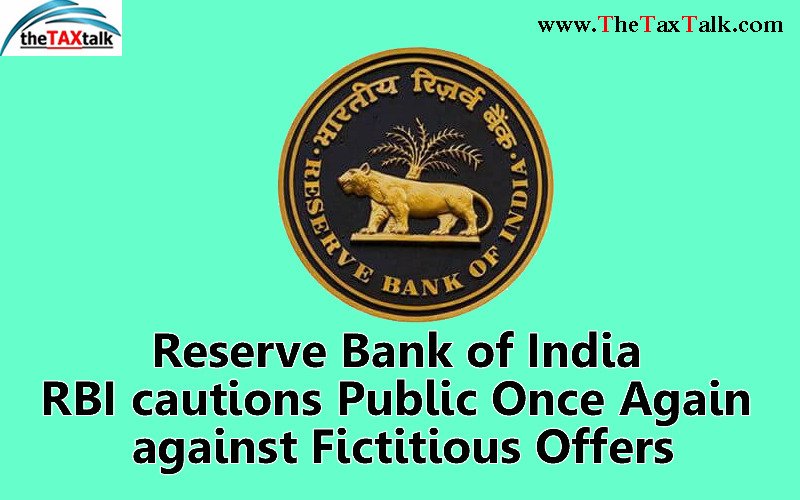![]()
Reserve Bank of India
RBI cautions Public Once Again against Fictitious Offers
The Reserve Bank of India has today reiterated that it never contacts the public via unsolicited phone calls or emails asking for money or any other type of personal information. The Reserve Bank does not maintain/give money/foreign currency or any other type of funds to individual or opens accounts for/in the name of individuals. The Reserve Bank has urged the public to remain alert and not to fall prey to frauds or scams perpetrated by individuals who impersonate to be employees of the Reserve Bank of India.
RBI Cautions
-
RBI does not hold any accounts for individuals.
-
Beware of impersonated names of RBI officials
-
Nobody from RBI calls up people about lottery winnings/funds received from abroad
-
RBI does not send any emails intimating award of lottery funds, etc.
-
RBI does not send any sms or letter or email to communicate fictitious offers of lottery winnings or funds received from abroad.
-
The only official and genuine website of the Reserve Bank of India is (www.rbi.org.in) and the public may be careful and not get misled by fake websites with similar addresses beginning with ‘Reserve Bank’, ‘RBI’, etc., along with fake logos.
-
Inform local police or cyber crime authority about such frauds.
The Reserve Bank of India has, on several occasions in the past, cautioned the members of public not to fall prey to fictitious offers / lottery winnings / remittance of cheap funds in foreign currency from abroad by so-called foreign entities/ individuals or to Indian residents acting as representatives of such entities/individuals.
Describing the modus operandi of the fraud, the Reserve Bank has stated that the fraudsters send attractive offers to gullible public through letters, e-mails, mobile phones, SMSs, etc.
To lend credence to such offers, the communication is often sent on/from letterheads/websites that appear to be like that of some public authorities like the Reserve Bank of India.
The offers are purportedly signed by top executives/senior officials of such authorities.
While the names of the officials might be correct but their signatures are fake. The offer document would contain contact details of a so-called RBI officer working in some department in the Reserve Bank/public authorities.
The fraudsters initially ask potential victims to deposit small sums of money for reasons, such as, processing fees/transaction fees/tax clearance charges/conversion charges, clearing fees, etc. The victims are asked to deposit the money in a specified account in a bank.
The fraudsters often have multiple accounts in the names of individuals or proprietary concerns in different bank branches for collecting such charges. Genuine but gullible account holders are persuaded by the fraudsters to even lend their accounts for such fraudulent activities on the promise of receiving some commission.
Once the initial amount is deposited, demands for more money follow with more official sounding reasons. After accumulating a sizeable amount in these accounts, the fraudsters withdraw or transfer the money abroad and vanish leaving the victims in a lurch. Many residents have already become victims and have lost huge sums of money by falling for such fictitious offers.
The public is advised to register their complaints with the local law enforcement agencies.
The Reserve Bank has given the list of such nodal agencies with whom the public can register complaints in its Press Release dated January 10, 2012.


